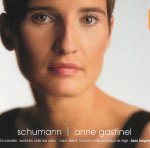The young French cellist Anne Gastinel gives an understated performance of Schumann’s cello concerto, aiming to clarify its often dense textures by taking a broadly unhurried approach. The corollary is that her account often sounds too cautious. Alongside watchful restraint, however, goes an admirably secure technique, so at no point does she sound in less than total control. The finest moments come in the Adagio, where Gastinel shows her keenest understanding of the elusive, internalized character of the work in the moving dialogue involving the orchestra’s principal cellist. Elsewhere, this performance needs more dramatic contrast and vitality, particularly in the finale–ideally captured in Heinrich Schiff’s punchy resolve in his own account as he forges through its testing staccato passages, generating maximal sonority and impact by playing right at the heel of the bow. Gastinel’s reading is much less incisive, lacking Schiff’s weighty physical presence, even though she plays the cadenza faultlessly.
In addition to its technical challenges for the performer, this concerto is just as problematic from the sound engineer’s point of view, as Schumann’s score is unhelpfully littered with registral pitfalls. If you follow along with the score during Naïve’s classy production, you’ll be amazed at how much previously undetected detailing emerges. Gastinel’s cello is never placed too far forward, so the general impression is one of large-scale chamber music. The subtle interplay between second violins and violas comes across with remarkable clarity, while double bass, clarinet, and bassoon lines are all precisely focused. The Liège Philharmonic gives attentive support under Louis Langrée, though Haitink (leading the Berlin Philharmonic for Schiff) serves up more of the tight inner fabric of Schumann’s orchestration. Gastinel’s accounts of the shorter pieces with piano are nicely done, but for playing of complete authority choose Schiff’s Philips survey of Schumann’s cello works.
































